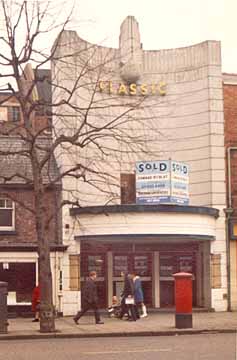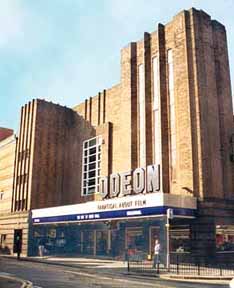Introduction
Motion picture film was introduced in 1896. Soon several venues in Chester were showing the new wonder on an occasional basis. One of the earliest advertised in the local press was Wray's Kineoptoscope, demonstrated to Chester people at the Temperance Hall, George Street from 27th-29th January 1897
The Royal Cinematograph came to the Royalty Theatre, City Road in February 1897. Film pioneer Bert Acres ran this.
Films were shown again in 1898 when Thomas' Cinematograph made an appearance. These were described as “the most wonderful living pictures ever seen”.
The year 1900 saw animated pictures shown at the Music Hall in St. Werburgh Street. In 1901, animated pictures of the Boer War were screened here. The same year also brought Douglas Eley's Eleygraph, showing pictures of the Boer war at the Temperance Hall. In 1908 the London Animated Picture Company came to the Music Hall with interludes by Fred Kembo, a baritone vocalist.
 Films continued to have occasional screenings until the arrival of the Picturedrome in Eastgate Street. This had formerly been the Corn Exchange and for a short time was advertised as the 'Corn Exchange Cinema'. The Picturedrome, run by Will Hunter was advertised as a ‘Popular Picture Playhouse’ and ran from 1909-1924. Performances were twice nightly at 7pm and 9pm. Film was shown in the upper part of the building. The site was eventually taken over by F.W Woolworth. You can see a photograph of it here. Films continued to have occasional screenings until the arrival of the Picturedrome in Eastgate Street. This had formerly been the Corn Exchange and for a short time was advertised as the 'Corn Exchange Cinema'. The Picturedrome, run by Will Hunter was advertised as a ‘Popular Picture Playhouse’ and ran from 1909-1924. Performances were twice nightly at 7pm and 9pm. Film was shown in the upper part of the building. The site was eventually taken over by F.W Woolworth. You can see a photograph of it here.
In May 1909, the annual Pat Collins Fair arrived with a new cinema attraction called 'Wonderland'. Collins went on to run several cinemas.
Foregate Street in 1971: the recently-closed Classic cinema just before it, together with neighbouring properties, was demolished to make way for a large C&A store. Woolworth's occupies the site today.
On 19th June 1911 the Glynne Picture Hall arrived in Foregate Street. The deputy mayor, R.C. Davies opened the building, which was later called The Glynn Picture House. Mayor D. L Hewitt should have opened it, but was detained in London.
The Glynn was run by The Glynn Animated Picture Company formed by Glynn Hill and G.E. Bulford. The hall had seating for 750 and was the head office of the company.
Their other cinemas were the Central Shrewsbury and the Glynn Wrexham. The Tudor-style frontage still remains. The interior was gutted by fire when it was the 'Why' store. It was re-built, becoming an Edward's Bar, followed by the Foregate Bar. It is now closed undergoing refurbishment.
The Glynn was described as "A High Class Entertainment of Animated Pictures". Owners Gaumont British closed it on 5 September 1931 with the film Lure of the South Seas. This was a few months after the opening of the Gaumont Palace in Brook Street.
 The Music Hall showed films on a regular basis from 1915 and was converted in 1921. It was advertised as 'The Oldest Cinema in The World'. This should have read 'Probably the Oldest Building in The World To Have Shown Films'- part of it dating back to the year 1280. On September 23 1929 the Music Hall screened Chester's first 'Talkie', The Singing Fool, starring Al Jolson. The sound was on disc, a system that was soon taken over by sound on film. The Music Hall showed films on a regular basis from 1915 and was converted in 1921. It was advertised as 'The Oldest Cinema in The World'. This should have read 'Probably the Oldest Building in The World To Have Shown Films'- part of it dating back to the year 1280. On September 23 1929 the Music Hall screened Chester's first 'Talkie', The Singing Fool, starring Al Jolson. The sound was on disc, a system that was soon taken over by sound on film.
Right: Chester's last city centre cinema, the splendid 1930s Art Deco Odeon in Town Hall Square. The new signage was added, after some controversy, in 2002. The Odeon closed in 2006 and years later, we are still awaiting its reopening as Chester's new theatre.
Pat Collins opened his Cinema Deluxe, Brook Street on 18th April 1921. Lady Arthur Grosvenor opened this. Takings from the first performance went to the YMCA. The cinema became the Majestic in 1926, closing as a cinema in September 1956 and re-opening as the Majestic Ballroom Eight years later, it became the inevitable bingo hall before its auditorium was demolished to make way for Chester's Inner Ring Road. The frontage was retained, however, and turned into a shop, which it remains today. Collins planned to open another hall on Foregate Street, but for some reason this did not come to fruition.
Finally, the Park Cinema, Saltney opened its doors on 21st May 1923. This was a one level hall, closing in 1959.
Now go on to learn a little about the unique Music Hall Cinema- or visit a remarkable website dedicated to the history and preservation of 'picture palaces' worldwide: Cinema Treasures. Another superb source is the Bill Douglas Centre for the History of Cinema and Popular Culture. |

 Films continued to have occasional screenings until the arrival of the
Films continued to have occasional screenings until the arrival of the  The
The